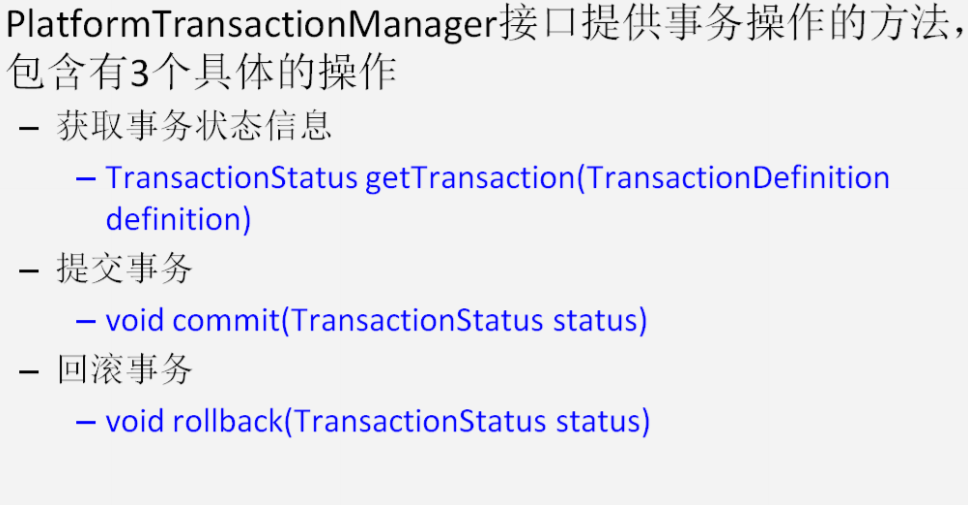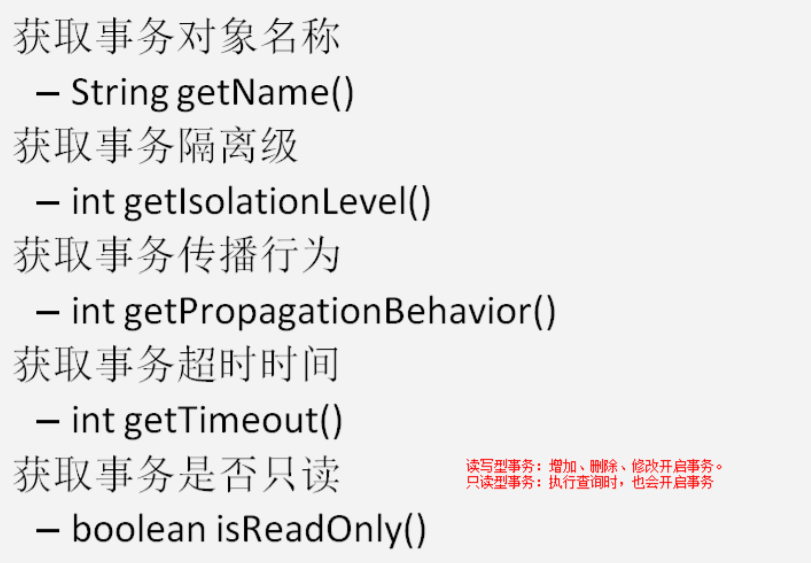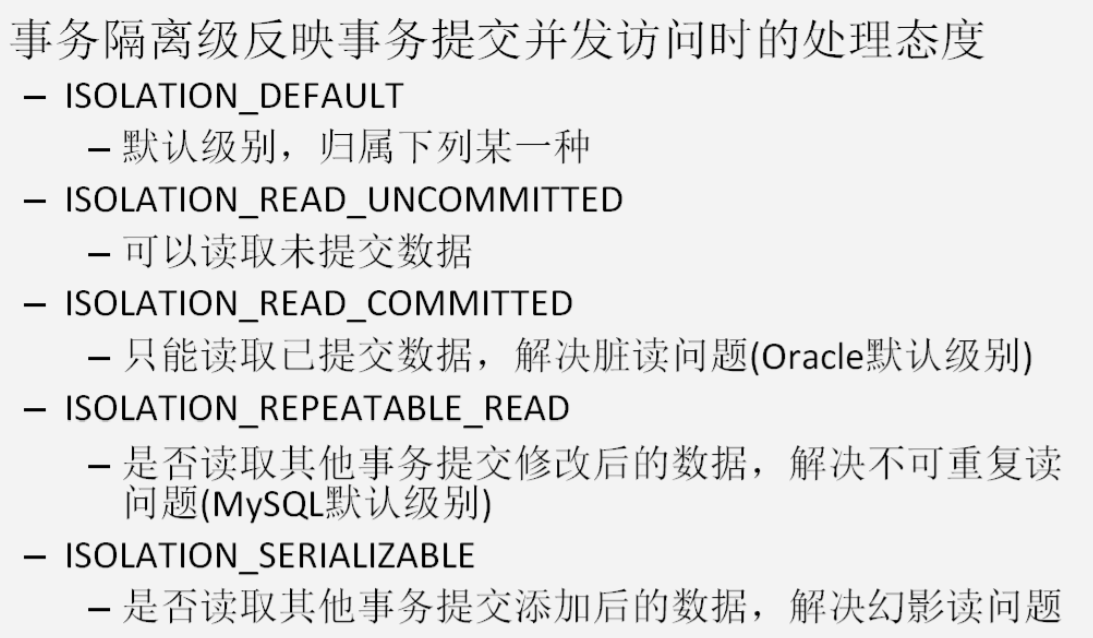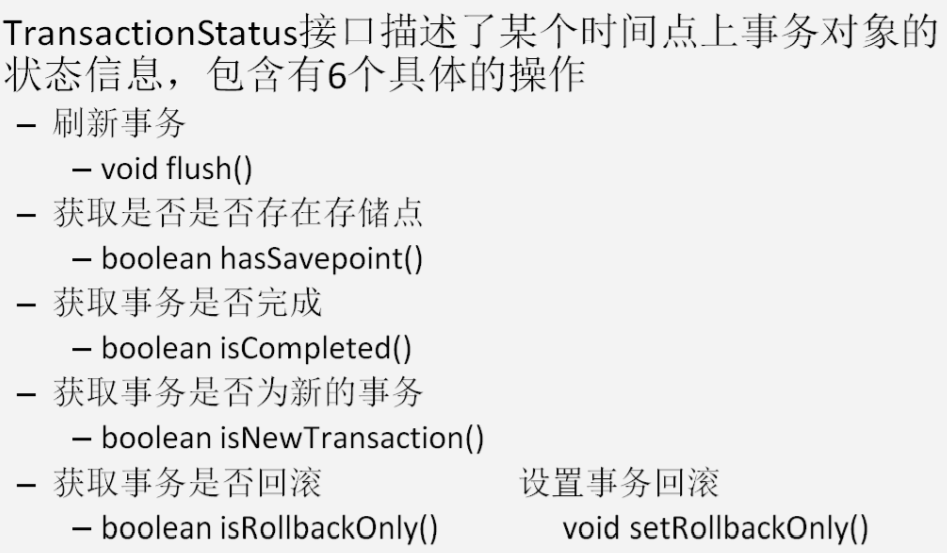Spring框架:第四篇
第一章: Spring 中的 JdbcTemplate
1.1-JdbcTemplate 概述
它是 spring 框架中提供的一个对象,是对原始 Jdbc API 对象的简单封装。spring 框架为我们提供了很多 的操作模板类。
操作关系型数据的:
- JdbcTemplate
- HibernateTemplate
操作 nosql 数据库的:
- RedisTemplate
操作消息队列的:
- JmsTemplate
1.2-JdbcTemplate快速入门
Maven工程
<dependencies>
<dependency>
<groupId>junit</groupId>
<artifactId>junit</artifactId>
<version>4.12</version>
</dependency>
<!--spring-context-->
<dependency>
<groupId>org.springframework</groupId>
<artifactId>spring-context</artifactId>
<version>5.2.3.RELEASE</version>
</dependency>
<!--【spring-jdbc】-->
<dependency>
<groupId>org.springframework</groupId>
<artifactId>spring-jdbc</artifactId>
<version>5.2.3.RELEASE</version>
</dependency>
<!--spring-tx-->
<dependency>
<groupId>org.springframework</groupId>
<artifactId>spring-tx</artifactId>
<version>5.2.3.RELEASE</version>
</dependency>
<!--mysql-->
<dependency>
<groupId>mysql</groupId>
<artifactId>mysql-connector-java</artifactId>
<version>5.1.26</version>
</dependency>
</dependencies>
数据库脚本
CREATE DATABASE IF NOT EXISTS db1
USE db1
CREATE TABLE account(
id INT PRIMARY KEY AUTO_INCREMENT,
NAME VARCHAR(40),
money FLOAT
)CHARACTER SET utf8 COLLATE utf8_general_ci;
INSERT INTO account(NAME,money) VALUES('aaa',1000);
INSERT INTO account(NAME,money) VALUES('bbb',1000);
实体类
public class Account {
private int id;
private String name;
private float money;
public int getId() {
return id;
}
public void setId(int id) {
this.id = id;
}
public String getName() {
return name;
}
public void setName(String name) {
this.name = name;
}
public float getMoney() {
return money;
}
public void setMoney(float money) {
this.money = money;
}
@Override
public String toString() {
return "Account{" +
"id=" + id +
", name='" + name + '\'' +
", money=" + money +
'}';
}
}
JdbcTemplate测试类
public class Demo01 {
public static void main(String[] args) {
// 【创建Spring提供的数据源对象】
DriverManagerDataSource ds = new DriverManagerDataSource();
// 设置驱动
ds.setDriverClassName("com.mysql.jdbc.Driver");
// 设置连接
ds.setUrl("jdbc:mysql://localhost:3306/db1");
// 设置数据库登录用户名
ds.setUsername("root");
// 设置数据库登录密码
ds.setPassword("root");
// 【创建JdbcTemplate对象】
JdbcTemplate jt = new JdbcTemplate();
// 设置数据源
jt.setDataSource(ds);
// 向数据库中添加一条数据
int row = jt.update("insert into account(name,money) values(?,?)","CCC",2000);
System.out.println(row);
}
}
1.3-Spring配置数据源及CRUD
Spring配置XML
<?xml version="1.0" encoding="UTF-8"?>
<beans xmlns="http://www.springframework.org/schema/beans"
xmlns:xsi="http://www.w3.org/2001/XMLSchema-instance"
xsi:schemaLocation="http://www.springframework.org/schema/beans
https://www.springframework.org/schema/beans/spring-beans.xsd">
<!--配置数据源-->
<bean id="dataSource" class="org.springframework.jdbc.datasource.DriverManagerDataSource">
<property name="driverClassName" value="com.mysql.jdbc.Driver"></property>
<property name="url" value="jdbc:mysql://localhost:3306/db1"></property>
<property name="username" value="root"></property>
<property name="password" value="root"></property>
</bean>
<!--配置JdbcTemplate-->
<bean id="jdbcTemplate" class="org.springframework.jdbc.core.JdbcTemplate">
<property name="dataSource" ref="dataSource"></property>
</bean>
<!--配置AccountDao-->
<bean id="accountDao" class="cn.lpl666.dao.impl.AccountImpl">
<property name="jt" ref="jdbcTemplate"></property>
</bean>
</beans>
测试类
public class Demo02 {
public static void main(String[] args) {
// 创建容器对象
ApplicationContext ac = new ClassPathXmlApplicationContext("bean.xml");
// 创建JdbcTemplate
JdbcTemplate jt = ac.getBean("jdbcTemplate",JdbcTemplate.class);
//【插入】
// int row = jt.update("insert into account(name,money) values(?,?)","DDD",2000);
// System.out.println(row);
//【更新】
// int row = jt.update("update account set name=? where id=?","ddd",4);
// System.out.println(row);
//【删除】
// int row = jt.update("delete from account where id=?",4);
// System.out.println(row);
//【查询结果集-集合】
// List<Account> list = jt.query("select * from account where money>?",new BeanPropertyRowMapper<Account>(Account.class),10);
// System.out.println(list);
//【查询结果-单个】
// List<Account> list = jt.query("select * from account where id=?",new BeanPropertyRowMapper<Account>(Account.class),1);
// System.out.println(list.get(0));
//【查询单行单列】
// Long aLong = jt.queryForObject("select count(*) from account where money>?", Long.class, 10);
// System.out.println(aLong);
}
}
1.4-Dao 继承 JdbcDaoSupport
JdbcDaoSupport
// JdbcDaoSupport 是 spring 框架为我们提供的一个类,该类中定义了一个 JdbcTemplate 对象,我们可以
直接获取使用,但是要想创建该对象,需要为其提供一个数据源:具体源码如下:
public abstract class JdbcDaoSupport extends DaoSupport {
//定义对象
private JdbcTemplate jdbcTemplate;
//set 方法注入数据源,判断是否注入了,注入了就创建 JdbcTemplate
public final void setDataSource(DataSource dataSource) {
if (this.jdbcTemplate == null || dataSource != this.jdbcTemplate.getDataSource())
{ //如果提供了数据源就创建 JdbcTemplate
this.jdbcTemplate = createJdbcTemplate(dataSource);
initTemplateConfig();
}
}
//使用数据源创建 JdcbTemplate
protected JdbcTemplate createJdbcTemplate(DataSource dataSource) {
return new JdbcTemplate(dataSource);
}
//当然,我们也可以通过注入 JdbcTemplate 对象
public final void setJdbcTemplate(JdbcTemplate jdbcTemplate) {
this.jdbcTemplate = jdbcTemplate;
initTemplateConfig();
}
//使用 getJdbcTmeplate 方法获取操作模板对象
public final JdbcTemplate getJdbcTemplate() {
return this.jdbcTemplate;
}
Dao层
接口
public interface IAccountDao {
/**
* 查询所有
* @return
*/
List<Account> findAll();
/**
* 查询一个
* @param id
* @return
*/
Account findOne(int id);
/**
* 更新一个
* @param account
* @return
*/
boolean update(Account account);
}
实现类
package cn.lpl666.dao.impl;
import cn.lpl666.dao.IAccountDao;
import cn.lpl666.domain.Account;
// import cn.lpl666.util.JdbcSupport;
import org.springframework.jdbc.core.BeanPropertyRowMapper;
import org.springframework.jdbc.core.JdbcTemplate;
import org.springframework.jdbc.core.support.JdbcDaoSupport;
import java.util.List;
//public class AccountImpl extends JdbcSupport implements IAccountDao
public class AccountImpl extends JdbcDaoSupport implements IAccountDao {
@Override
public List<Account> findAll() {
List<Account> list = getJdbcTemplate().query("select * from account",new BeanPropertyRowMapper<Account>(Account.class));
return list;
}
@Override
public Account findOne(int id) {
List<Account> list = getJdbcTemplate().query("select * from account where id=?",new BeanPropertyRowMapper<Account>(Account.class),id);
return list.isEmpty()?null:list.get(0);
}
@Override
public boolean update(Account account) {
int row = getJdbcTemplate().update("update account set name=?,money=? where id=?", account.getName(), account.getMoney(), account.getId());
return row>0;
}
}
第二章:Spring中的事务控制
2.1-Spring 事务控制我们要明确的
第一:JavaEE 体系进行分层开发,事务处理位于业务层,Spring 提供了分层设计业务层的事务处理解决方 案。
第二:spring 框架为我们提供了一组事务控制的接口。具体在后面的第二小节介绍。这组接口是在 spring-tx-5.0.2.RELEASE.jar 中。
第三:spring 的事务控制都是基于 AOP 的,它既可以使用编程的方式实现,也可以使用配置的方式实现。本章描述的是使用配置的方式实现。
2.2-Spring 中事务控制的 API 介绍
PlatformTransactionManager
此接口是 spring 的事务管理器,它里面提供了我们常用的操作事务的方法,如下图:

我们在开发中都是使用它的实现类,如下图:

TransactionDefinition
它是事务的定义信息对象,里面有如下方法:

事务的隔离级别

事务的传播行为

赶超时间
默认值是-1,没有超时限制。如果有,以秒为单位进行设置。
是否是只读事务
建议查询时设置为只读
TransactionStatus
此接口提供的是事务具体的运行状态,方法介绍如下图:

2.3-基于 XML 的声明式事务控制(配置方式)
搭建Maven工程
<dependencies>
<!--junit-->
<dependency>
<groupId>junit</groupId>
<artifactId>junit</artifactId>
<version>4.12</version>
<scope>test</scope>
</dependency>
<!--spring-context-->
<dependency>
<groupId>org.springframework</groupId>
<artifactId>spring-context</artifactId>
<version>5.2.3.RELEASE</version>
</dependency>
<!--spring-tx-->
<dependency>
<groupId>org.springframework</groupId>
<artifactId>spring-tx</artifactId>
<version>5.2.3.RELEASE</version>
</dependency>
<!--spring-jdbc-->
<dependency>
<groupId>org.springframework</groupId>
<artifactId>spring-jdbc</artifactId>
<version>5.2.3.RELEASE</version>
</dependency>
<!--spring-test-->
<dependency>
<groupId>org.springframework</groupId>
<artifactId>spring-test</artifactId>
<version>5.2.3.RELEASE</version>
</dependency>
<!--mysql-->
<dependency>
<groupId>mysql</groupId>
<artifactId>mysql-connector-java</artifactId>
<version>5.1.26</version>
</dependency>
<!--aspectjweaver-->
<dependency>
<groupId>org.aspectj</groupId>
<artifactId>aspectjweaver</artifactId>
<version>1.9.5</version>
</dependency>
</dependencies>
第二步:创建 spring 的配置文件并导入约束
此处需要导入 aop 和 tx 两个名称空间
<?xml version="1.0" encoding="UTF-8"?>
<beans xmlns="http://www.springframework.org/schema/beans"
xmlns:xsi="http://www.w3.org/2001/XMLSchema-instance"
xmlns:aop="http://www.springframework.org/schema/aop"
xmlns:tx="http://www.springframework.org/schema/tx"
xsi:schemaLocation="http://www.springframework.org/schema/beans
http://www.springframework.org/schema/beans/spring-beans.xsd
http://www.springframework.org/schema/tx
http://www.springframework.org/schema/tx/spring-tx.xsd
http://www.springframework.org/schema/aop
http://www.springframework.org/schema/aop/spring-aop.xsd">
</beans>
第三步:Dao层接口和实现类
接口
public interface IAccountDao {
/**
* 查询一个
* @param id
* @return
*/
Account findOne(int id);
/**
* 更新一个
* @param account
* @return
*/
boolean update(Account account);
}
实现类
public class AccountDaoImpl extends JdbcDaoSupport implements IAccountDao {
@Override
public Account findOne(int id) {
String sql = "SELECT * FROM account WHERE id = ?";
List<Account> list = getJdbcTemplate().query(sql,new BeanPropertyRowMapper<Account>(Account.class),id);
return list==null?null:list.get(0);
}
@Override
public boolean update(Account account) {
String sql = "UPDATE account SET NAME=?,money=? WHERE id = ?";
int row = getJdbcTemplate().update(sql, account.getName(), account.getMoney(), account.getId());
return row>0;
}
}
第四步:Service层接口和实现类
接口
public interface IAccountService {
/**
* 转账
* @param oneId 转账用户id
* @param twoId 收账用户id
* @param money 转账钱数
*/
void transfer(int oneId,int twoId,float money);
}
实现类
public class AccountSerice implements IAccountService {
private IAccountDao dao = null;
public void setDao(IAccountDao dao) {
this.dao = dao;
}
@Override
public void transfer(int oneId, int twoId, float money) {
Account one = dao.findOne(oneId);
Account two = dao.findOne(twoId);
one.setMoney(one.getMoney()-money);
two.setMoney(two.getMoney()+money);
dao.update(one);
//int i = 10/0;
dao.update(two);
}
}
第五步:Spring配置
<?xml version="1.0" encoding="UTF-8"?>
<beans xmlns="http://www.springframework.org/schema/beans"
xmlns:xsi="http://www.w3.org/2001/XMLSchema-instance"
xmlns:aop="http://www.springframework.org/schema/aop"
xmlns:tx="http://www.springframework.org/schema/tx"
xsi:schemaLocation="
http://www.springframework.org/schema/beans
http://www.springframework.org/schema/beans/spring-beans.xsd
http://www.springframework.org/schema/tx
http://www.springframework.org/schema/tx/spring-tx.xsd
http://www.springframework.org/schema/aop
http://www.springframework.org/schema/aop/spring-aop.xsd">
<!--【配置数据源】-->
<bean id="dataSource" class="org.springframework.jdbc.datasource.DriverManagerDataSource">
<property name="driverClassName" value="com.mysql.jdbc.Driver"></property>
<property name="url" value="jdbc:mysql://localhost:3306/db1"></property>
<property name="username" value="root"></property>
<property name="password" value="root"></property>
</bean>
<!--【配置AccountDao】-->
<bean id="accountDao" class="cn.lpl666.dao.impl.AccountDaoImpl">
<property name="dataSource" ref="dataSource"></property>
</bean>
<!--【配置AccountService】-->
<bean id="accountService" class="cn.lpl666.service.impl.AccountSerice">
<property name="dao" ref="accountDao"></property>
</bean>
<!--【配置事务管理器】-->
<bean id="transferManger" class="org.springframework.jdbc.datasource.DataSourceTransactionManager">
<property name="dataSource" ref="dataSource"></property>
</bean>
<!--【配置事务通知】-->
<tx:advice id="txAdivce" transaction-manager="transferManger">
<!--配置事务属性-->
<tx:attributes>
<!--propagation:用于指定事务的传播行为。默认值是REQUIRED,表示一定会有事务,增删改的选择。查询方法可以选择SUPPORTS。-->
<tx:method name="*" propagation="REQUIRED"/>
<tx:method name="find*" propagation="SUPPORTS"></tx:method>
</tx:attributes>
</tx:advice>
<!--【配置AOP】-->
<aop:config>
<!--配置管理包的表达式-->
<aop:pointcut id="servicePath" expression="execution(* cn.lpl666.service.impl.*.*(..))"></aop:pointcut>
<!--建立切入点表达式和事务通知的对应关系-->
<aop:advisor advice-ref="txAdivce" pointcut-ref="servicePath"></aop:advisor>
</aop:config>
</beans>
在 tx:advice 标签内部 配置事务的属性
- read-only:是否是只读事务。默认 false,不只读。
- isolation:指定事务的隔离级别。默认值是使用数据库的默认隔离级别。
- propagation:指定事务的传播行为。
- timeout:指定超时时间。默认值为:-1。永不超时。
- rollback-for:用于指定一个异常,当执行产生该异常时,事务回滚。产生其他异常,事务不回滚。 没有默认值,任何异常都回滚。
- no-rollback-for:用于指定一个异常,当产生该异常时,事务不回滚,产生其他异常时,事务回 滚。没有默认值,任何异常都回滚。
2.4-基于注解的事务控制方式1
Dao层实现类
@Repository("accountDao")
public class AccountDaoImpl implements IAccountDao {
@Autowired
@Qualifier("jdbcTemplate")
private JdbcTemplate jdbcTemplate = null;
@Override
public Account findOne(int id) {
String sql = "SELECT * FROM account WHERE id = ?";
List<Account> list = jdbcTemplate.query(sql,new BeanPropertyRowMapper<Account>(Account.class),id);
return list==null?null:list.get(0);
}
@Override
public boolean update(Account account) {
String sql = "UPDATE account SET NAME=?,money=? WHERE id = ?";
int row = jdbcTemplate.update(sql, account.getName(), account.getMoney(), account.getId());
return row>0;
}
}
服务层实现类
Service("accountService")
@Transactional(propagation = Propagation.SUPPORTS,readOnly = true)
public class AccountService implements IAccountService {
@Autowired
@Qualifier("accountDao")
private IAccountDao dao = null;
@Transactional(propagation = Propagation.REQUIRED,readOnly = false)
@Override
public void transfer(int oneId, int twoId, float money) {
Account one = dao.findOne(oneId);
Account two = dao.findOne(twoId);
one.setMoney(one.getMoney()-money);
two.setMoney(two.getMoney()+money);
dao.update(one);
// int i = 10/0;
dao.update(two);
}
}
配置文件
<?xml version="1.0" encoding="UTF-8"?>
<beans xmlns="http://www.springframework.org/schema/beans"
xmlns:xsi="http://www.w3.org/2001/XMLSchema-instance"
xmlns:context="http://www.springframework.org/schema/context"
xmlns:aop="http://www.springframework.org/schema/aop"
xmlns:tx="http://www.springframework.org/schema/tx"
xsi:schemaLocation="
http://www.springframework.org/schema/beans
http://www.springframework.org/schema/beans/spring-beans.xsd
http://www.springframework.org/schema/tx
http://www.springframework.org/schema/tx/spring-tx.xsd
http://www.springframework.org/schema/aop
http://www.springframework.org/schema/aop/spring-aop.xsd
http://www.springframework.org/schema/context
http://www.springframework.org/schema/context/spring-context.xsd">
<!-- 告知 spring 创建容器时要扫描的包 -->
<context:component-scan base-package="cn.lpl666"/>
<!--配置数据源-->
<bean id="dataSource" class="org.springframework.jdbc.datasource.DriverManagerDataSource">
<property name="driverClassName" value="com.mysql.jdbc.Driver"></property>
<property name="url" value="jdbc:mysql://localhost:3306/db1"></property>
<property name="username" value="root"></property>
<property name="password" value="root"></property>
</bean>
<!--配置jdbcTemplate-->
<bean id="jdbcTemplate" class="org.springframework.jdbc.core.JdbcTemplate">
<property name="dataSource" ref="dataSource"></property>
</bean>
<!--配置事务管理器-->
<bean id="transferManger" class="org.springframework.jdbc.datasource.DataSourceTransactionManager">
<property name="dataSource" ref="dataSource"></property>
</bean>
<!-- 开启spring对注解事务的支持-->
<tx:annotation-driven transaction-manager="transferManger"></tx:annotation-driven>
</beans>
2.5-基于注解的事务控制方式2
纯注解
Dao层实现类
@Repository("accountDao")
public class AccountDaoImpl implements IAccountDao {
@Autowired
@Qualifier("jdbcTemplate")
private JdbcTemplate jdbcTemplate = null;
@Override
public Account findOne(int id) {
String sql = "SELECT * FROM account WHERE id = ?";
List<Account> list = jdbcTemplate.query(sql,new BeanPropertyRowMapper<Account>(Account.class),id);
return list==null?null:list.get(0);
}
@Override
public boolean update(Account account) {
String sql = "UPDATE account SET NAME=?,money=? WHERE id = ?";
int row = jdbcTemplate.update(sql, account.getName(), account.getMoney(), account.getId());
return row>0;
}
}
服务层实现类
@Service("accountService")
@Transactional(propagation = Propagation.SUPPORTS,readOnly = true)
public class AccountService implements IAccountService {
@Autowired
@Qualifier("accountDao")
private IAccountDao dao = null;
@Transactional(propagation = Propagation.REQUIRED,readOnly = false)
@Override
public void transfer(int oneId, int twoId, float money) {
Account one = dao.findOne(oneId);
Account two = dao.findOne(twoId);
one.setMoney(one.getMoney()-money);
two.setMoney(two.getMoney()+money);
dao.update(one);
int i = 10/0;
dao.update(two);
}
}
JDBC配置类
package cn.lpl666.config;
import org.springframework.beans.factory.annotation.Qualifier;
import org.springframework.beans.factory.annotation.Value;
import org.springframework.context.annotation.Bean;
import org.springframework.context.annotation.PropertySource;
import org.springframework.context.annotation.Scope;
import org.springframework.jdbc.core.JdbcTemplate;
import org.springframework.jdbc.datasource.DriverManagerDataSource;
import javax.sql.DataSource;
@PropertySource("classpath:jdbc.properties")
public class JdbcConfig {
@Value("${jdbc.driver}")
private String driver;
@Value("${jdbc.url}")
private String url;
@Value("${jdbc.user}")
private String username;
@Value("${jdbc.password}")
private String password;
/**
* 创建QueryRunner对象
* @param ds
* @return
*/
@Bean(name="jdbcTemplate")
public JdbcTemplate createJdbcTemplate(@Qualifier("dataSource") DataSource ds){
return new JdbcTemplate(ds);
}
/**
* 创建数据源对象
* @return
*/
@Bean(name = "dataSource")
public DataSource createDataSource() {
DriverManagerDataSource dm = new DriverManagerDataSource();
dm.setDriverClassName(driver);
dm.setUrl(url);
dm.setUsername(username);
dm.setPassword(password);
return dm;
}
}
JDBC配置文件
jdbc.driver=com.mysql.jdbc.Driver
jdbc.url=jdbc:mysql://localhost:3306/db1
jdbc.user=root
jdbc.password=root
事务管理配置类
public class TransactionConfig {
@Bean(name="transactionManager")
public PlatformTransactionManager createTransactionManager(@Qualifier("dataSource") DataSource dataSource){
return new DataSourceTransactionManager(dataSource);
}
}
Spring配置类
@Configuration
@ComponentScan("cn.lpl666") // spring容器要扫描的包
@Import({JdbcConfig.class,TransactionConfig.class}) // 导入其他配置类
@EnableTransactionManagement
public class SpringConfiguration {
}
测试类
@RunWith(SpringJUnit4ClassRunner.class)
@ContextConfiguration(classes = SpringConfiguration.class)
public class AccountTest2 {
@Autowired
@Qualifier("accountService")
private IAccountService service = null;
@Test
public void transfer(){
service.transfer(1,2,100);
}
}


 浙公网安备 33010602011771号
浙公网安备 33010602011771号